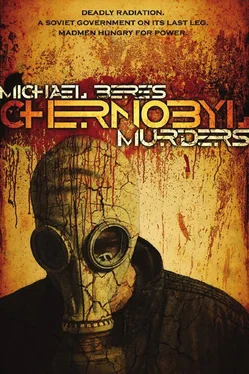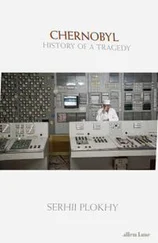Michael Beres - Chernobyl Murders
Здесь есть возможность читать онлайн «Michael Beres - Chernobyl Murders» весь текст электронной книги совершенно бесплатно (целиком полную версию без сокращений). В некоторых случаях можно слушать аудио, скачать через торрент в формате fb2 и присутствует краткое содержание. Жанр: Триллер, на английском языке. Описание произведения, (предисловие) а так же отзывы посетителей доступны на портале библиотеки ЛибКат.
- Название:Chernobyl Murders
- Автор:
- Жанр:
- Год:неизвестен
- ISBN:нет данных
- Рейтинг книги:4 / 5. Голосов: 1
-
Избранное:Добавить в избранное
- Отзывы:
-
Ваша оценка:
- 80
- 1
- 2
- 3
- 4
- 5
Chernobyl Murders: краткое содержание, описание и аннотация
Предлагаем к чтению аннотацию, описание, краткое содержание или предисловие (зависит от того, что написал сам автор книги «Chernobyl Murders»). Если вы не нашли необходимую информацию о книге — напишите в комментариях, мы постараемся отыскать её.
Chernobyl Murders — читать онлайн бесплатно полную книгу (весь текст) целиком
Ниже представлен текст книги, разбитый по страницам. Система сохранения места последней прочитанной страницы, позволяет с удобством читать онлайн бесплатно книгу «Chernobyl Murders», без необходимости каждый раз заново искать на чём Вы остановились. Поставьте закладку, и сможете в любой момент перейти на страницу, на которой закончили чтение.
Интервал:
Закладка:
Taking Detective Horvath and Juli Popovics to Kiev would have put the KGB in a bad light in Kiev and in Moscow. Dumenko thinks Gorbachev has enough trouble right now.”
“So Komarov did plan Pavel’s death?”
“Yes. But now, Nikolai, I must give you the order I gave the rest of the men. The order comes directly from Deputy Chairman Dumenko.
You are to discuss this incident with no one. When we return to Kiev, all of you, including myself, will be given a final briefing.”
“Is this how the KGB eliminates its rotten apples, Captain?”
“Things are changing in the Soviet Union, Nikolai. The KGB must change with them. Even the Chernobyl disaster will change us. Gorbachev realizes this, and so do others on the politburo. For now we should salute the heroes created by the Chernobyl disaster.
Men like Colonel Zamyatin, whom I met on my way from Moscow to Kiev. He is in charge of army refugee and cleanup operations.
Many have volunteered to help. They are calling themselves liquidators. Perhaps the Chernobyl accident will usher in the new era of openness Gorbachev has spoken of. Everything changes, Nikolai.
Everything.”
As they drove, the number of houses increased, and soon they could see a town in the distance. The lights from the town spread before them, taking away the blackness of night for a few minutes.
Then they were in the dark again.
“What was the name of the town?” asked Nikolai. “I didn’t notice the sign.”
“Sambor,” said Captain Brovko. “Fifty more kilometers, and we’ll be in Lvov, where our dinner and our beds await us.”
Back in Sambor, the windows of the houses flickered as residents watched the latest report about Chernobyl. No one had noticed the two Volgas speeding through town on their way to Lvov.
36
August 1986
It was Sunday. The bells of Vienna’s churches had tolled the noon hour. The view from the seventh-floor window of the Vienna Intercontinental Hotel was facing northeast across the city park, where people in colorful summer clothing walked along tree-lined paths.
Juli stood looking out the window, holding her abdomen. Although her baby was not moving now, she had felt it earlier. The baby moved most in the morning, waking her. But now, as she looked out the window, the baby was asleep in its small world. The only feeling Juli had now was the tingling of her newly stretched skin.
According to tests several days earlier in Budapest at the Institute for Radiobiology, everything was normal. The doctors said the baby’s growth did not seem affected by radiation. But there were no guarantees. There were never guarantees. The technician asked if she wanted to know the sex of the baby, but she declined. She already had possible names picked out, but she did not want to tell Lazlo, at least not until the baby was closer to being born. If it was a boy, she wanted to name him Mihaly. If it was a girl, she wanted the name Tamara.
After they crossed into Czechoslovakia, several days passed before they could cross farther into Hungary, north of Budapest. Farmers in Czechoslovakia hid them and the Skoda until searches decreased. In Hungary, they abandoned the Skoda, and more farmers transported them south to Miskolc and got them on a train to Budapest.
After the tests at the Institute for Radiobiology, they thought they would have trouble crossing the Hungarian-Austrian border.
Instead, a doctor at the institute referred them to Dr. Istvan Szabo at the Hungarian National Atomic Energy Commission. When they told what they knew about the Chernobyl accident, Dr. Szabo began work on temporary visas. During the wait for visas, Juli and Lazlo stayed in a small apartment in Budapest.
It was a strange interlude in Budapest. While she was happy to be with Lazlo, there was always the chance someone processing their visas would recognize them as the man and woman on the run from the Ukrainian militia. She and Lazlo agreed they should make the best of what could be a temporary freedom if Hungarian authorities discovered their identities. While in Budapest, she and Lazlo fell more deeply in love and, with the baby between them as they made love, became a family.
Their assumed name in Budapest was Petavari, Andras and Margit Petavari. The only time they left the apartment was when Dr. Szabo’s assistant picked them up to go to the Institute for Radiobiology or to Dr. Szabo’s office. If anyone approached and asked questions, they were to say they were brought from an area in Eastern Hungary for tests relating to the Chernobyl accident.
Everything was arranged by Dr. Szabo. They would accompany the doctor to the August meeting of the International Atomic Energy Agency in Vienna and repeat to delegates from the member nations what they knew about Chernobyl. The meeting was to begin tomorrow. Yesterday, at the Parliament Building, she and Lazlo were offered political asylum by the Austrian minister of foreign affairs.
Juli turned from the window, walked across the room, and sat on the ornate sofa. The dress she wore, purchased in Budapest, was already too tight when she sat down. Tomorrow, after a morning session at the Atomic Energy Agency, Dr. Szabo had promised his assistant would accompany Juli to a local maternity shop.
Shopping for clothes! A suite at the Vienna Intercontinental!
And all of this after days and nights on the run during which a mil-dewed tent or a straw-filled barn had seemed precious shelters.
Lazlo was in the bedroom on the telephone. Because there was no telephone at the farmhouse, Lazlo had left a message at the office of the Ulyanov collective’s chairman. A few minutes ago, the operator rang with a call from Kisbor. Although she could not hear what he said, Juli heard Lazlo’s voice coming from the bedroom, calm and controlled. Lazlo had not asked her to leave the bedroom during the call, but she wanted Lazlo to be able to speak with Nina in private. It was hard enough to talk knowing the PK might be listening.
This morning, when Juli had called Aunt Magda, she had been careful not to mention anything about how she and Lazlo escaped.
Aunt Magda assured her everything was fine in Visenka and also gave Juli a message from Marina and Vasily. They planned to marry soon and had moved to a resettlement apartment near Kiev. The news was not all good, however. Vasily’s mother and sister were sick from the high radiation they received, and both were being treated at a Kiev hospital.
When Lazlo’s voice stopped, Juli closed her eyes. She heard the door open, and Lazlo sat beside her, putting his arm around her.
When she opened her eyes, she saw Lazlo smiling. The scar on his upper lip from Komarov’s beating made his smile seem crooked.
But soon, according to the doctor in Budapest, his smile would be straight again.
“Everything is fine at the farm,” said Lazlo. “The KGB never returned after they took us away. Nina and the girls are being checked periodically at a hospital in Uzhgorod. No organ damage, but the girls especially will have to be watched. Nina’s decided to stay in Kisbor. Bela wants to help her build a house next to his.”
Juli reached out and touched Lazlo’s chin with her finger. “Your smile is gone.”
“Did I have one?”
“When you first sat down.”
“I wish there was something I could do for Nina.”
“You did, Laz. You went to your family when they needed you.”
“And you came when I needed you.”
Lazlo stood and went to the window. He looked east, his profile so sad when he wasn’t smiling. “Earlier you mentioned your friend Aleksandra Yasinsky, who was taken away when she spoke openly about radiation dangers. It made me think again about the man named Pavel, and also about the Gypsy on the Romanian border. We’ve left so many people back there, Juli. I hope leaving is the right thing to do.”
Читать дальшеИнтервал:
Закладка:
Похожие книги на «Chernobyl Murders»
Представляем Вашему вниманию похожие книги на «Chernobyl Murders» списком для выбора. Мы отобрали схожую по названию и смыслу литературу в надежде предоставить читателям больше вариантов отыскать новые, интересные, ещё непрочитанные произведения.
Обсуждение, отзывы о книге «Chernobyl Murders» и просто собственные мнения читателей. Оставьте ваши комментарии, напишите, что Вы думаете о произведении, его смысле или главных героях. Укажите что конкретно понравилось, а что нет, и почему Вы так считаете.












